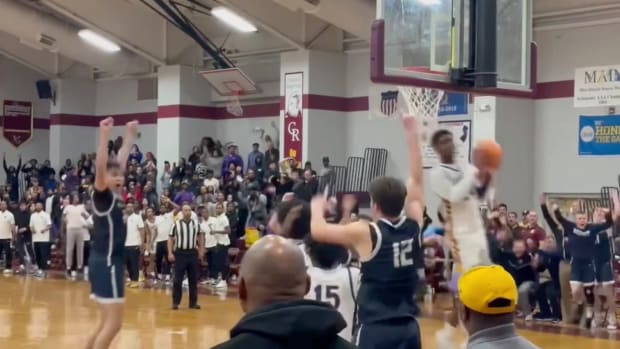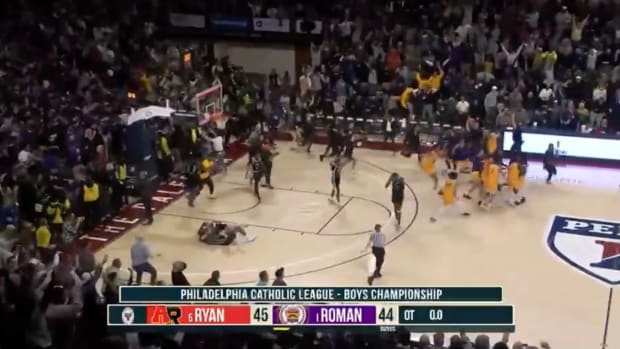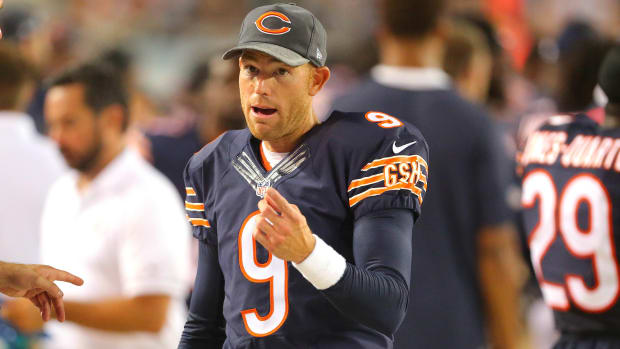
SI 60 Q&A: S.L. Price on what the heart of Aliquippa means to him
In more than two decades at Sports Illustrated, S.L. Price has earned a reputation as one of the most accomplished and revered sportswriters in the country. Among his many fantastic bonus stories for SI is "The Heart Of Football Beats In Aliquippa," which ran in the Jan. 31, 2011 issue. It details the struggles of a western Pennsylvania mill town that had undergone a radical five-decade transformation that included economic decline and racial strife, but had one constant: a dominant high school football team that produced a slew of legendary players.
Price is currently working on a book about Aliquippa that will be published by SI Books and Grove Atlantic. I spoke to him about the story, the town and the amazing people he has never forgotten. For more from S.L. Price, follow him on Twitter Follow Price on Twitter @bySLPrice.
SI: Where did you find this story?
PRICE: It came from [SI assistant managing editor] Mark Mravic. His parents grew up in Aliquippa. He came to me and said, “There’s this town that’s produced Mike Ditka and Tony Dorsett and it’s a mill town and the team keeps winning even though the town is shrinking. Would you be interested in writing about it?” I said, “That sounds great.”
I went up there and it was precisely as he said and more. The town is extraordinary. Every town in western Pennsylvania is full of great football, and this town has produced three, arguably four, Hall of Famers: Ditka and Dorsett, Ty Law should be and Darrelle Revis may well end up being one. And then [ex-NFL player] Sean Gilbert is from there, [basketball legend] Pete Maravich is from there, a former Surgeon General is from there, Henry Mancini, one of the great composers, is from there. The list went on and on.
The population of the town was once 30,000 people and now is down to 9,000, but the wins kept coming. The pool [of players] gets smaller and smaller and they still were beating the hell out of people. It was just an astonishingly rich place. It was emblematically American. There’s a lot going on there, and by the way, no one else was there, no one else was doing the story.
• Read all the stories and Q&As in the SI 60 series
SI: What happened when you first got there?
PRICE: It was extraordinary. I went up there in the fall of 2010 and spent time with the people. One of the things I found about the town is that things had gotten so bad or had been so good there was a certain lack of BS in the air. Everyone knew so much about each other that no one could hide behind false modesty or keep their skeletons in the closet. They were willing to talk about it in a way that was blunt and honest and funny in its own way.
The Heart Of Football Beats In Aliquippa: Hope and despair in a Pennsylvania mill town
SI: A winning high school football team in a dying town: it sounds like ground that’s been covered before, especially by Friday Night Lights. Were you worried about doing a Friday Night Lights redux?
PRICE: Weirdly enough, because of the famous names involved, I thought it would be different. I just felt like it wasn’t as obscure as Friday Night Lights, because it involved people that everybody would know and that gave it a different kind of kick. I’ve never seen or read Friday Night Lights, partially because of that. I thought, “Should I read it now?” and then I thought, “I better not,” because of how it looms over the entire subject matter. As a result I’ve still never seen or read it. What I didn’t want to do was write a year in the life. I wanted to do a different kind of picture.
SI: How do you begin the process of diving into this very complicated, very dense topic?
PRICE: Tennessee Williams was talking about journalism when he talked about the kindness of strangers because essentially, I got adopted by a number of people in the town who were incredibly generous. I got there and said I wanted to do a story and people couldn’t have been more generous with their stories. It was sort of astounding. Access is usually problematic [in covering sports]. Everybody is handled, any kind of big athlete is surrounded by layers and layers of people who want to tell you no. I think that people in Aliquippa really felt like their story is important. They wanted it told, it wasn’t just the story of the football team. That included the bad, by the way. Most people understood: this is how it is.
I think there’s overall a feeling or a fear that the town may be going away, that it’s going keep shrinking and not last.
SI: You spoke to Darrelle Revis, Mike Ditka and Tony Dorsett, who were among those who got out and made it to the NFL. Were any of them reluctant to discuss their pasts with you?
PRICE: Darrelle Revis was incredible. I got him, if I remember correctly, through the Jets and went and saw him at his apartment in New Jersey. He couldn’t have been more generous and open about the town. He cares very deeply about the town. The same reason why he felt compelled to keep going back there is the reason he talked about it.
Ditka I got in his steakhouse, and I got him through his PR person at the steakhouse. He was great.
Dorsett was astonishing. He met me at a Pitt game and the next morning he took me on a tour of Aliquippa, to the ballfield, through his old neighborhood and all the way to his mom’s house. In some ways I feel he is the soul of the piece. I was sort of living through that town with him.
That’s no to undermine or disregard the other people. Like Willie Walker, I keep saying they were unbelievable, they were just so casually generous and they were so expressive in how they told their stories.
A Name On The Wall: Football player Bob Kalsu was the only U.S. pro athlete to die in Vietnam
SI: How long did it take you to report the story? Was it the only story you were working on at the time?
PRICE: I definitely was only working on that. It was after the U.S. Open and I spent weeks and weeks, probably three or four weeks reporting it. I went to New Jersey to see Revis, went back to Pittsburgh to see Ditka and took many trips up to Aliquippa.
When I’m interviewing people that’s the most quote unquote “fun” part of the job. You’re investigating, being curious and people are filling up the bucket. Then you transcribe things and you live the story again. When you write, you’re thinking about it all day long, trying to fix the structure. To me a kicker is more important than a lead, it always has been. It’s the bell that keeps ringing once the person stops reading the story. You don’t really remember the lead but you do remember the kicker, if it’s natural and organic and actually works. I knew all along that as soon as I saw what happened with Tony Dorsett going into his mother’s house that that would be the kicker.
If you know that’s where you’re leading to it makes your writing a lot easier. Suddenly you’ve got a funnel that’s all coming to a point and that’s your point. I got lucky with that.
SI: You mentioned the structure earlier. How did you do that for this story with so many different elements?
PRICE: I was trying to piece together this story bit by bit. It’s always about the material that you get and obviously I thought Willie Walker’s story was incredibly moving and scary in a way. So as soon as I spoke to him I knew that that was going to be my lead.
The second section sort of goes off kilter and there’s this weird paragraph about football and how it isn’t kind; it isn’t there to soothe a town’s ills. I just found it terribly ironic. This is a savage game and a hurtful game and even since it was published we’ve found out how even more brutal it is. The idea that this game -- which is about conquering territory and machismo and all that stuff -- is somehow the soothing balm, or consoling element, is strange to me.
As a result I wanted to point that out because to me it’s not a happy story, it’s not a happy ending. I’m not sure football is in and of itself happy. The game is more reflective of the town than we expect. It’s tough, it’s brutal, it’s merciless and it leaves behind a lot of damage.
SI: There’s a particularly powerful anecdote involving Walker that is about a drug deal he witnessed. Were you surprised to be getting these kinds of stories?
PRICE: When he told me that, it was one of those moments . . . just chills. I heard that and I was almost speechless. I think I’ve heard a lot in 30 years as a sportswriter but that was a new one. We talked about it at length, Willie and I. He was horrified by it but part of him was necessarily cold about it. He knew it was bad and yet he was like, “I’ve seen worse.” I knew it had to be in the story.
You’re trying to make this new for people. Sportswriting is not coal mining but there is an inherent difficulty in trying to make new something that happens over and over again. We have to find something that makes it different. There’s been so many mind-numbing stories about crime and violence and everything else that you have to find a way to make it new. It made the horror of what was happening in this town seem new.
SI 60 Q&A: William Nack on Bob Kalsu, Vietnam and leaving Sports Illustrated
SI: The story ran in the Super Bowl preview issue, long after the high school football season had ended. Was there a firm deadline with it?
PRICE: If I remember correctly there certainly was a deadline, but when it ran -- weirdly enough -- Pittsburgh was on the cover, because the Steelers were going to the Super Bowl. I thought they could have actually made some sort of link on the cover and they didn’t. They could have done some sort of western Pennsylvania thing.
It wasn’t timely but I tend to think they had to get it in before the end of the football season. I remember them being really patient with it. Everybody knew that it had the potential to be a good story.
SI: Who edited the story for you?
PRICE: I think it was [assistant managing editor] Chris Hunt, an incredible editor. He has cut so many stories of mine in such surgical ways that I don’t even know that I’m bleeding. He’s an astonishingly deft editor. Drew Lawrence was the fact-checker on it and did an incredible job also. It was almost 10,000 words, and it was as long as anything I’ve ever written. I give them an incredible amount of credit for running the whole thing. If it was a high school football story without Ditka, Dorsett and the more famous names I suspect that it wouldn’t have been as long.
SI: What did the town think of the story after it came out?
PRICE: I know some people were upset with it in the sense that they felt it was too negative. But the people who I trusted there were like, This is what happened. This is how it is. We understand it, and this is what happened to us. The mill went down, crime took over and our kids are enduring in spite of it. Their achievement is not possible to understand unless you underline what they went through to achieve it.
I’ve been back a ton of times and the people have been incredible to me. If they weren’t so positive I probably wouldn’t be able to write the book.
SI: What about the response from readers?
PRICE: I got an incredible response from readers. People responded in a way that I’d hoped. They saw in it what I saw in it, which is the value in writing this. I kind of feared people would say, ‘”Who cares?” but they didn’t.
SI: You’re now working on a book about Aliquippa. Was there a lot more to say about the town and the people?
PRICE: I would not write it if I felt I had told the story in full. It was one of the few stories I’ve ever told for SI where when I finished it I knew I had so much more that had to leave in my notebook. In many ways the book goes far deeper into it and I learned a lot more about Aliquippa.
SI: The headline of the story is “The Heart Of Football Beats In Aliquippa.” What did you make of that?
PRICE: I thought it was strange. In fact that was one of the main objections to the story. From one teacher in Aliquippa -- a very bright guy – he said, “I don’t understand the headline. What did it have to do with the story?” To tell you the truth I rarely look at the headline because I’m so emotionally wrapped up that I can’t really read any of it clearly and the headline is the least of my concerns. But I get it somewhat and yet I also don’t understand it and I’m mystified by the headline. When the guy asked me I said, “I don’t know what to tell you. It’s a really unusual headline.”
SI: Did you ever get an explanation?
PRICE: No.
SI: What have you taken away from the experience of Aliquippa?
PRICE: I rarely if ever have been in a place or been on a story where people were so unremittingly honest and lacking in bulls---. It was just like: This is who we are, this is what’s happened to us, this is how we’re getting by, this is how we’re getting through it. The hard times carved away the media BS. The quality of people I met there were astonishing. It’s got its share of bad actors but I just found myself really impressed. Whatever that honesty is I think that’s part of the quality that makes the story special.




